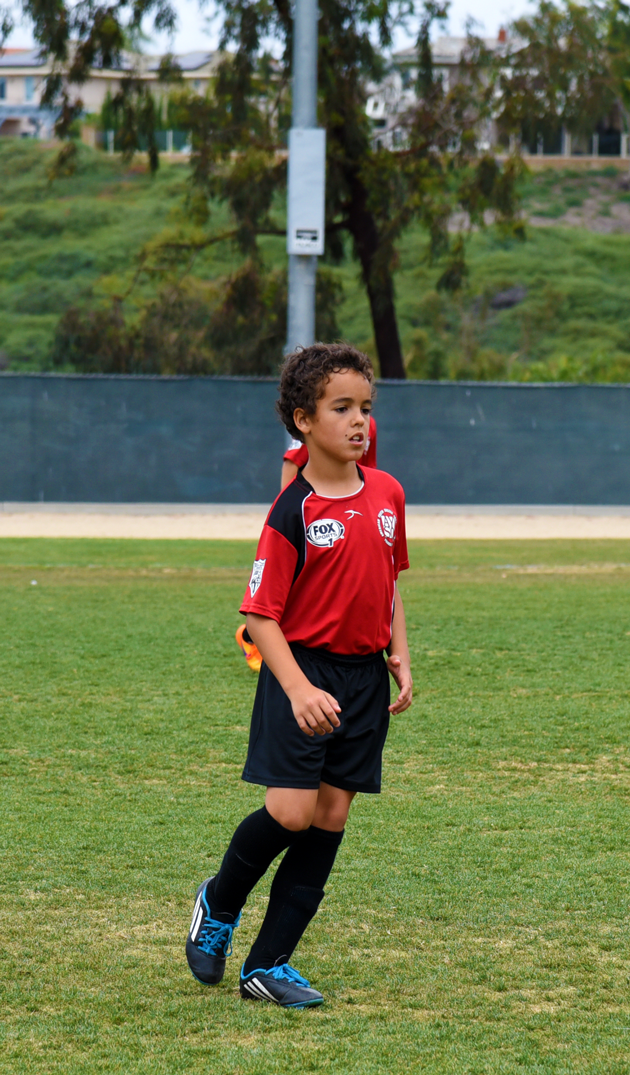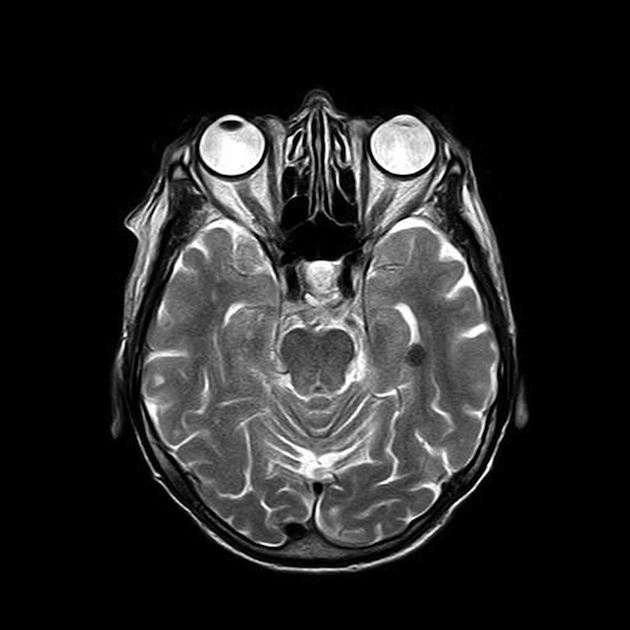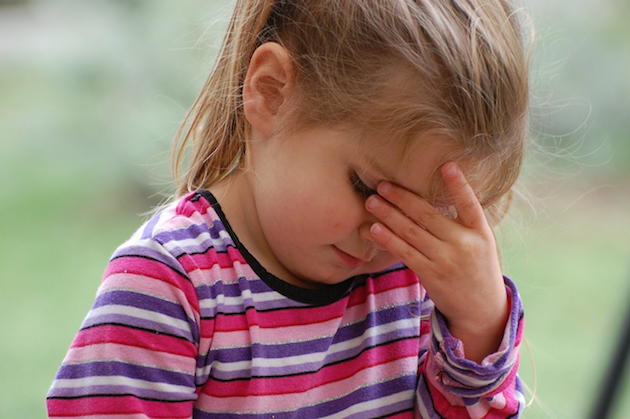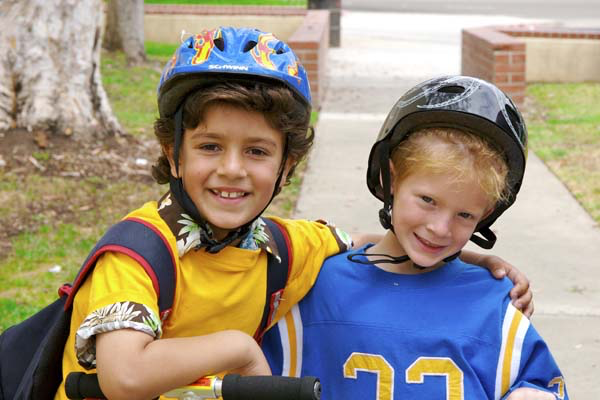{Sponsored}
One of the unique aspects of being both a mom and a nurse is that I am often more calm in situations involving illness and injury. I’ve seen enough sick infants and children during my work as an NICU nurse to know when to be legitimately concerned, and when a hug, a band-aid, or a dose of ibuprofen will suffice. There is however, one type of injury that makes me nervous…concussions. In fact, anytime my kids have suffered a head injury (fortunately that has been very minimal), I always err on the side of caution and have them evaluated immediately.

If your child plays sports, plays at the park, or is involved with any number of extracurricular activities, he/she is at risk of suffering a concussion. There are some sports and activities that involve more risk, including soccer, football, and gymnastics. But it would be nearly impossible to predict those extraordinary circumstances where a child might suffer a concussion from falling off of a bed (or other elevated surface), falling out of a shopping cart, getting hit in the head with a ball, or getting kicked in the head by another child.
 I recently had the privilege of talking to Dr. Chris Min, licensed pediatric psychologist at CHOC Children’s Hospital and CHOC Children’s at Mission Hospital about concussions. While this type of injury can feel overwhelming for a family, prompt recognition and management ensure that a child recovers completely without any long term effects.
I recently had the privilege of talking to Dr. Chris Min, licensed pediatric psychologist at CHOC Children’s Hospital and CHOC Children’s at Mission Hospital about concussions. While this type of injury can feel overwhelming for a family, prompt recognition and management ensure that a child recovers completely without any long term effects.
What is a concussion?
A concussion occurs when a child sustains a jarring to the head where the brain is affected. Unlike an injury to another body part (such as an ankle), the brain is trapped inside of a “box” (the skull) and the swelling does not have anywhere to go. The subsequent swelling or bruising of the brain results in non-specific symptoms such as dizziness, loss of consciousness, difficulty remembering things, and disorientation. The concussion is the swelling or injury process.
What are the signs and symptoms of a concussion?
When a child suffers a concussion, there is a consolation of symptoms you can see. According to Dr. Min, the tricky part is that symptoms can show up right away or much later. Signs and symptoms of a concussion include dizziness, loss of consciousness, difficulty remembering things (i.e. who they are, where they are), disorientation, difficulty walking, difficulty with balance, headache, vision abnormalities, and a general sense that things are not right.
What should I do if I suspect my child has a concussion?
If you suspect that your child has a concussion, schedule an appointment with your pediatrician. You should also remove your child from the activity (i.e. he/she should be pulled from the game, practice, etc.) and monitor them until he/she has been evaluated.
**If your child is experiencing severe signs and symptoms including seizures, prolonged loss of consciousness, prolonged disorientation or any sign that he/she has suffered bleeding inside the brain, take him/her to the Emergency Room.

How is a concussion diagnosed?
Unfortunately, there is no definitive concussion test. According to Dr. Min, concussions do not show up on an MRI or CT scan, however that does not mean the child does not have a concussion. Imaging will identify any bleeding or abnormalities within the brain.
What is the treatment for a concussion?
Once your child has been evaluated by a Pediatrician, studies indicate that he/she should undergo a period of cognitive and physical rest. According to Dr. Min, it was previously thought that children should undergo a 2-3 week “cocooning” period where they lie quietly in the dark with minimal stimulation. At CHOC’s Concussion Clinic, providers have found that 2 days is the optimal period of time to limit cognitive and physical activity. This includes limiting exposure to electronics, physical activity, and activities requiring cognitive function. After this period of time, children should be encouraged to become active physically and cognitively as he/she is able to tolerate. “Every patient will vary with how much they are able to tolerate.” Concussion treatment should involve increasing physical and cognitive activity each day as tolerated until the child returns to normal functioning.
It is important for parents to understand that a concussion is a temporary injury and most children will return to normal functioning without any long-term effects or complications.
The number one reason why kids should be removed from an activity if a concussion is suspected
One of the most important takeaways from my conversation with Dr. Min was the importance of removing a child from an activity if a concussion is suspected. “There is a phenomenon called second impact syndrome. If someone has a concussion and the brain is swelling and trying to repair itself, incurring another concussion can result in death.” A child with a concussion will likely have a delayed reaction time and struggle with balance. This puts them at risk for another head injury.

The link between concussion and mental illness
Concussion does not cause mental illness. However, mental illness can prolong the recovery time or exacerbate symptoms of a concussion. If a child is having difficulty recovering from a concussion, he/she should be evaluated for a mental illness. “The number one reason patients don’t get better after a prolonged period of time is mental illness,” according to Dr. Min. Patients who still have difficulty sleeping and suffer from fatigue, dizziness, and irritability can have an underlying mental health condition that was not previously diagnosed. Patients can also develop depression or anxiety after a concussion because of the stress involved with this type of injury.

Concussions in adolescence
It has been well-documented that adolescence is one of the hardest phases of life that an individual goes through. The physical and hormonal changes that take place often result in a teen feeling like an adult physically, but still having a brain that is immature. The demands of sports, academics, music, extracurricular activities, and social activities are high during this stage of life. If a teenager suffers a concussion, this can be very disruptive. High-achieving teens have the most difficulty recovering from a concussion because of how disruptive the injury is to their life. Families and providers should take this into consideration when managing a teen who has suffered a concussion.
Who is at risk for concussions?
Any child or teen who is involved with contact sports is at risk for suffering a concussion. Parents and providers can help mitigate that risk by addressing and pre-existing issues that might make the child more susceptible to an injury. This can include issues with balance, vision, reaction time and more.

CHOC Children’s Hospital Concussion Clinic
CHOC Children’s Hospital has a Concussion Clinic which serves the community in two ways. The multidisciplinary clinic includes a neurologist and a neuropsychologist to evaluate and treat patients who are referred after sustaining a concussion. The clinic also works to disseminate information to pediatricians and providers in order to equip them to treat and manage concussions correctly.
- Discover Luxury at Sonesta Irvine: Your Ideal Staycation - August 8, 2024
- CHOC Walk Returns to the Disneyland Resort – Special Events and Ways to Support - June 28, 2023
- Beastly Ball Returns to the Los Angeles Zoo - May 8, 2023


Leave a Reply